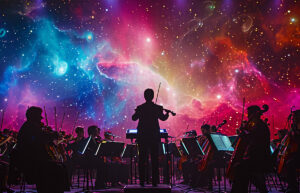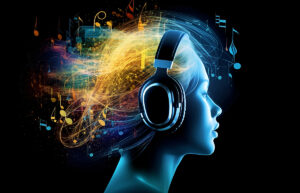The Complete Guide On Why Music Is Important

Music is a multifaceted form of artistic expression that transcends cultural boundaries. It encompasses a wide spectrum of genres, styles, and techniques, and appeals to diverse emotions and experiences. It has the power to evoke nostalgia, joy, sadness, or excitement, and serves as a universal language that connects people on a profound level. Musicians use elements such as rhythm, melody, harmony, and timbre to craft compositions, employing instruments, voices, or technology to create harmonious arrangements that resonate with audiences worldwide.
Welcome to TheDemoStop, now join the community!
Connect with artists, fans and producers around the world.
Why is music important?
Music is of utmost importance because of its profound effects on human existence. By bridging linguistic, cultural, and geographic divides, it acts as a universal language that allows people all over the world to communicate and express their emotions. Music is deeply ingrained in certain traditions and is intrinsic to cultural identity, even beyond its capacity to elicit strong emotions and express sentiments. Music-making improves memory, focus, and problem-solving abilities while also stimulating cognitive development.
Music is a universal language
Music is regarded as a universal language because it transcends cultural, linguistic, and geographical boundaries, allowing individuals to connect and communicate emotions and ideas on a profound level, regardless of their background or native tongue. The universality enables music to evoke feelings, convey messages, and create connections that surpass language and cultural differences, uniting people in a harmonious and deeply human way.
Impact of music on learning and memory
Music has a notable impact on learning and memory. It can enhance cognitive functions, aid in information retention, and improve learning experiences. Certain types of music, especially classical music and ambient instrumental pieces, have been associated with increased focus and concentration. They can create an optimal environment for studying, reading, or working by reducing stress and distractions.
Eases anxiety
Music can reduce anxiety and stress. Listening to soothing music can trigger the release of neurotransmitters such as dopamine and serotonin, promoting relaxation and reducing feelings of anxiety and tension.
Helps us relax
Certain types of music, such as slow-tempo melodies or nature sounds, can induce a state of relaxation by slowing the heart rate, lowering blood pressure, and calming the nervous system. This aids in relaxation and stress reduction.
Increases cognitive ability
Music, whether through playing an instrument or listening attentively, can enhance cognitive abilities. It has been associated with improved memory, attention, and problem-solving skills, potentially strengthening neural connections and cognitive function.
Improves your mood
Music has a profound impact on emotions. Upbeat or cheerful melodies can uplift mood and create a positive atmosphere, whereas music with sentimental or nostalgic tones can evoke emotions, improving overall emotional well-being.
Helps you live longer
Some studies suggest that music’s positive effects on mental health and stress reduction can indirectly contribute to longevity. Reduced stress and improved mental health have a beneficial impact on overall health, potentially contributing to a longer lifespan.
Music and emotional well-being
Music plays a pivotal role in shaping emotional well-being by affecting our moods and emotions. It has the remarkable ability to evoke a wide range of feelings, from happiness and excitement to nostalgia or tranquility. When we listen to music that resonates with us, it can serve as a powerful emotional regulator, influencing and enhancing our emotions.
Musical pleasure
Music evokes pleasure and enjoyment. Pleasant melodies, harmonies, rhythms, or even the lyrics of a song can trigger positive emotional responses, leading to feelings of joy, excitement, or contentment.
Emotional mimicry
Music can induce emotional responses by mimicking or mirroring emotions expressed within the music itself. For instance, a melancholic melody can evoke feelings of sadness or introspection in the listener, whereas an upbeat rhythm prompts feelings of happiness or energy.
Mood regulation
Music is a powerful tool for regulating emotions and influencing mood and can help to uplift spirits, calm nerves, or provide comfort during times of distress. People often use music intentionally to match or alter their emotional state.
Memories
Music has a unique ability to evoke memories and associations. Hearing a particular song can bring back vivid recollections of past events, places, or people, tapping into our autobiographical memory and evoking strong emotional responses linked to those memories.
Action tendency
Certain types of music can influence action tendencies, prompting listeners to feel more energized, motivated, or relaxed. For example, upbeat and fast-paced music inspires movement or physical activity, whereas tranquil music encourages relaxation or contemplation.
Welcome to TheDemoStop, now join the community!
Connect with artists, fans and producers around the world.
Music and social interaction
Cooperation
People often find that music is a motivator for cooperation. Participants in collaborative music-making, whether playing in a band or chorus, must coordinate and work together. Collaborating for a shared musical objective cultivates solidarity, teamwork, and communication.
Empathy
Due to its capacity to elicit emotional connections between listeners and the song itself, music can arouse empathy. People can relate to the feelings expressed in songs, melodies, or live performances when they listen to music, which promotes empathy and understanding of other people’s experiences.
Social bond
Sharing musical experiences or participating in musical activities can strengthen social ties. People can develop bonds, foster camaraderie, and feel a sense of belonging by going to concerts, dances, or just listening to music together in a group environment. These connections can cut over social and cultural divides.
Importance of music in the education system
Enhanced memorization skills
Music education has been linked to improved memory retention. Learning music involves memorizing notes, rhythms, and patterns, which can enhance students’ overall memorization skills and aid in remembering information in other academic areas.
Keeping students engaged
Integrating music into education helps in maintaining students’ interest and engagement. The interactive and enjoyable nature of music education often captures students’ attention, making the learning process more enjoyable and effective.
Improved social skills
Participating in group music activities, such as choir, orchestra, or ensemble performances, cultivates teamwork, cooperation, and communication among students. Collaborating with peers in musical endeavors fosters social interaction and the development of interpersonal skills.
Develops creative thinking
Music encourages creative expression and imaginative thinking. Through composing, improvising, or interpreting music, students are encouraged to think creatively, explore new ideas, and develop their unique artistic voices.
Relaxation and healing
Music has therapeutic qualities that can help in relaxation and healing. In an educational setting, incorporating calming music or music therapy techniques can create a conducive environment for learning, reduce stress levels, and aid in emotional regulation among students.
Music and cultural significance
Vital for celebration
Music has an important cultural role in commemorating a range of events and occasions. Music is an integral part of ceremonies, festivals, and rituals in many cultures, serving as a means of expressing happiness, honoring life events, and fostering a sense of community.
Connections between cultures
Different cultural traditions, styles, and inspirations can be shared through music. Music acts as a bridge between these civilizations. People can connect and foster cultural variety and appreciation by learning to appreciate and comprehend various cultural manifestations through music.
Encourages people to open up with others
Music possesses a special power to dissolve barriers and promote emotional bonding. It frequently inspires people to be vulnerable and open with their emotions, experiences, and narratives. People are more likely to interact and communicate on a deeper level in social situations and during musical performances, which promotes understanding and empathy.
Welcome to TheDemoStop, now join the community!
Connect with artists, fans and producers around the world.
Conclusion
Why is music important? Music holds significance as it has the ability to evoke emotions, promote cultural identity, provide solace, inspire creativity, and bring people together, fostering connections and shared experiences across diverse backgrounds.
Music is a universal language: Music serves as a universal language, transcending barriers of cultures, language, and geography, allowing individuals to connect and communicate emotions and experiences across diverse backgrounds.
Impact of music on learning and memory: Engaging in music learning has been linked to improved memory skills, enhancing the brain’s ability to retain information and aiding in memory formation and recall.
Music and emotional well-being: Music significantly influences emotional well-being by regulating emotions, reducing stress, fostering connections, and providing a means for self-expression and relaxation.
Music and social interaction: Music encourages social interaction by fostering connections, promoting collaboration, and creating shared experiences that bring people together.
Importance of music in the education system: Music in the education system enhances memory, engagement, social skills, creative thinking, and relaxation, contributing to holistic student development.
Music and cultural significance: Music holds cultural significance by being integral to celebrations, bridging cultures, and fostering emotional connections among diverse communities.
FAQs
Why is music important in our life?
Music is important in our lives because it serves as a universal language, expressing emotions, preserving culture, enhancing cognition, fostering social connections, and promoting emotional well-being.
How does music affect our emotions?
Music impacts our emotions by evoking feelings and mood through melodies, rhythms, and lyrics, influencing our emotional state and triggering various responses such as joy, relaxation, sadness, or excitement.
What are the cognitive benefits of music education?
Music education enhances cognitive skills such as memory, attention, language processing, spatial-temporal skills, and executive functions, contributing to overall academic and intellectual development.
How does music bring people together both socially and culturally?
Music unites people socially through shared experiences and collaborations, while culturally, it acts as a bridge, fostering understanding and appreciation among diverse communities by exchanging traditions and values.
How can music change your life?
Music can change lives by influencing emotions, fostering connections, offering solace, inspiring creativity, providing a means of self-expression, and shaping personal identity and cultural connections.
Can music change your mood?
Yes, music has the power to influence and change one’s mood by evoking emotions, eliciting feelings of happiness, relaxation, excitement, or sadness, depending on the type and content of the music being listened to.
Does music make you happier?
Music has the ability to positively impact mood and often contributes to feelings of happiness or contentment by evoking emotions and enhancing overall well-being.
Why do I feel music so deeply?
You may feel music deeply because it resonates with emotions, memories, and experiences, triggering profound emotional responses due to its ability to connect with the human psyche on an intimate level.































































